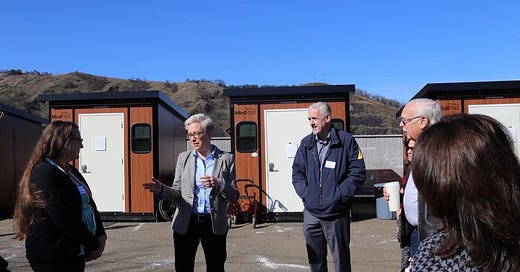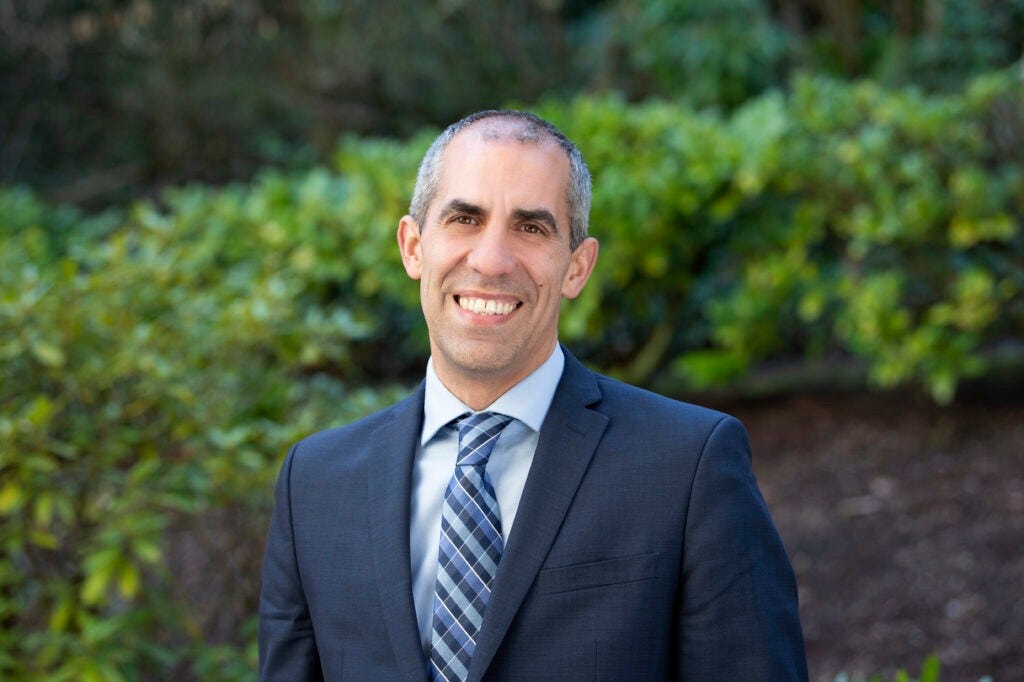The Liftoff: Another agency head resigns; Kotek tackles housing crisis
PLUS: Senior Biden official visits Portland; what the Gov's chief of staff does; veteran lawmaker announces retirement; what the decline in in-person workers means for Portland; and more!
Welcome back to The Liftoff!
It’s officially March, which means the Oregon legislature is in full swing, and we don’t want you to miss a beat. This week’s The Liftoff is full of details and tidbits about what is happening in the legislature—and around the state.
Our goal is to be your weekly source for all of Oregon’s top politics and government headlines. Please be in touch if you have tips, ideas, or just want to send us a note (good or bad!). We can only do this work with the help of subscribers and advertisers. So thank you—and please consider subscribing today.
1. Governor Kotek’s big housing bet
Governor Kotek on Tuesday testified before the Oregon legislature for the first time since taking office, asking the legislature to spend $155 million to reduce homelessness across Oregon. According to her office, HB 5019 would provide:
$85.2 million to rehouse people experiencing homelessness and expand shelter capacity. Specifically, this would rehouse 1,200 households, expand shelter capacity by 600 beds
$33.6 million to prevent homelessness, this would prevent homelessness for 8,750 households
$27.4 million to rehouse people experiencing homelessness and expand shelter capacity in the 26 rural counties, this would rehouse 450 households experiencing unsheltered homelessness; expand state’s shelter capacity by 100 beds
$3.9 million for emergency management response (OHCS and OEM)
$5 million direct allocation to federally recognized Tribes
$200,000 to develop a proposal for a long-term rent assistance program
If you haven’t heard Gov. Kotek’s nearly hourlong interview with Dave Miller on Think Out Loud, check it out here (transcribed or via audio).
Speaking of housing: Bend has enacted new camping measures, and OPB’s Central Oregon correspondent has an interesting story on how the new rules effect people who live on the streets. Could other cities follow?
The new rules include:
Campers must move at least 600 feet every 24 hours;
Only three campsites per city block;
Campers can’t build permanent structures;
If someone is living in a vehicle, it must be operational;
Car tires, spare bicycles and other items not deemed essential are not allowed.
2. What’s your cut of the kicker?
The Oregon Office of Economic Analysis has an interesting breakdown of the projected tax kicker (see above)—which as we reported last week, will send a record amount of money back to taxpayers. This years personal income kicker is projected to be $3.9 billion—a record amount.
3. What does the Governor’s Chief of Staff do? Nik Blosser gives the scoop
Nik Blosser has held jobs at the highest levels of the state and federal government. He served at Gov. Kate Brown's Chief of Staff for over three years, and then went on to serve as Deputy Cabinet Secretary and Special Assistant to President Joe Biden. Recently, he returned to Oregon to work as vice president for public policy, communications and public affairs at PGE.
In this episode, we ask Nik about what the Governor's chief of staff actually does—and how they navigate the challenging decisions that fall on their desk. We revisit some of the most difficult moments of the Kate Brown Administration, including COVID-19 and wildfires. We also ask Nik about what it's like working at the federal level. As you might have expected, there is also some time spent on fun stories from earlier days of Oregon politics.
4. Sponsored Message from Harrang Long P.C.: Harrang Long’s Government Relations Practice
This message is from our sponsor, Harrang Long P.C.
The 82nd Legislative Assembly is well under way, with bills working their way through committees as even more bills are introduced. Action by this year’s legislature will touch the lives of every Oregon resident, business, non-profit, and local government. As a law firm, Harrang Long P.C. has always recognized that achieving our clients’ goals sometimes requires a change in the law. And in other situations, clients need help stopping or changing proposed amendments to the law that put their interests at risk.
For decades, we have played a role in shaping Oregon law on many subjects, from narrow regulations to major policy changes implicating billions of dollars. Our lawyers work with clients to draft legislation, prepare legal opinions and testimony to share with legislators, coordinate with professional lobbyists, and work directly with policymakers. To learn more about Harrang Long’s Policy and Politics Practice, click here.
5. Headlines from Salem: Schroeder to step down, legislator pay proposal returns, and a veteran lawmaker retires
Interim director of the Oregon Health Authority, James Schroeder, stepped down Friday after two months on the job. From OPB: “Not only will Schroeder not seek to hold the OHA directorship permanently, he’s not necessarily staying around until Gov. Tina Kotek’s administration can find a replacement. His last day is March 17.” Governor Kotek said she will immediately begin a national search for his replacement, but plans to appoint another interim director.
Hospital staffing ratios under fire. Oregon health care unions want lawmakers to enact minimum staffing requirements for hospital nurses and other employees. Nurse managers statewide warn that rigid ratios would force patients to wait longer for treatment and curtail services.
Oregon lawmakers debate a pay raise…for themselves. According to OPB, Senate Bill 786 would bring legislators’ paychecks in line with the average wage for the more than 90% of workers whose employers pay unemployment taxes, which could increase the base pay of most lawmakers from $35,052 to $64,000 per year. Unlike the last proposal, this one seems to have the support of several major advocacy groups.
The Oregon Senate Health Committee heard Senate Bill 303, which would require psilocybin service centers to collect data on the health, education, race, income and other information of adults who use the hallucinogenic drug.
The Lund Report digs into the bill: “The bill comes as investors and entrepreneurs try to stand up a whole new industry in the state to meet expected demands. Oregon’s psilocybin program is expected to be up and running later this year, and other states pursuing similar measures are eyeing its implementation.”
A proposal by Senator Wlnsvey Campos (D-Aloha) made local and national waves. The Senator is proposing providing a $1,000 monthly stipend to homeless Oregonians with little strings attached. Senate Bill 603, which is also sponsored by Rep. Khanh Pham, would start providing the cash to 1,000 Oregonians as a trial run.
Hitting the breaks on tolls? Senate Bill 933, would hit the brakes on tolling plans. Under the bill, the Oregon Transportation Commission could not put tolls on I-205 or I-5, but would allow for tolling on the I-5 bridge.
Longtime eastern Oregon Sen. Bill Hansell (R-Athena) will retire in 2024. Political writer Dick Hughes wrote a nice column on why Hansell is “one of the good guys”.
Governor Kotek and Attorney General Rosenblum joined Mom’s Demand Action in Salem to call for more gun restrictions. The Oregonian’s Maxine Bernstein breaks down the gun bills still awaiting a hearing this legislative session:
House Bill 2005 would prohibit ghost guns, which are untraceable, and generally assembled at home with parts made at home, or bought online.
House Bill 2006 would raise the purchase age for semi-automatic rifles, other rifles and shotguns, from 18 to 21, with some exceptions for hunting rifles.
House Bill 2007 would allow local governments to ban concealed handguns in a public building. It expands on a law passed two years ago that prohibits concealed guns at the Capitol and Portland International Airport and gives school districts the choice to opt in.
House Bill 3060 would establish a state income tax credit for buying a gun safe or lock.
Senate Bill 551 would require school districts to notify families on district websites about how to securely store guns, and direct the Oregon Health Authority to make the safe storage information available to school districts.
6. Becerra comes to town (and other news from Portland)
Portland’s Clean Energy Fund is flush with cash, according to a report by Willamette Week. The PCEF, which was approved by Portland voters in 2018, is meant to fund climate projects that train and employ people of color and benefit low-income neighborhoods. “Although officials are allocating it as fast as they can, they will begin next year with $275 million in the bank—making PCEF one of the largest loosely restricted pots of money in the state.”
A senior Biden administration visited Portland last week. The U.S. health and human services secretary Xavier Becerra met with Governor Kotek, the Portland Public Schools Superintendent and others in Portland last week to discuss mental health issues facing students and resources available through state and federal dollars.
The other group in attendance? The University of Oregon’s Ballmer Institute for Children’s Behavioral Health, which will place its first class of 200 undergraduates into Portland Public Schools in the fall of 2023.
Portland Mayor Ted Wheeler nixed Nike’s request to have off-duty police officers provide security at its shuttered NE Portland factory store. Nike had offered to cover the cost of the officers to guard the store on Martin Luther King Jr. Boulevard, which they say has been riddled with crime.
Must See TV: KOIN 6 aired an hour-long special looking at the myriad of problems facing the state from fentanyl and other drugs. The panel included many familiar faces: Secretary of State Shemia Fagan, Portland City Commissioner Rene Gonzalez, Multnomah County Commissioner Sharon Meieran, Portland Police Association president Aaron Schmautz, small businesses, parents and more.
Yikes: Walmart is closing all of its Portland stores due a “record” level of retail theft.
7. ECONorthwest: What the decline of in-person workers means for Portland
Thanks to our friends at ECONorthwest for authoring this section.
The sharp increase in the share of employees who work from home (WFH) has altered the value propositions of downtowns across the U.S. And one study has shown that WFH is especially popular in cities like Portland with high shares of college-educated professional service workers. To get a better sense of the local WFH impacts, we used anonymous data from cell phones to compare downtown employment activity before and after the pandemic. More than 50,000 workers commuted to the downtown core on an average weekday in October 2019 (green bars). Three years later, the number of downtown commuters is down by more than half (red bars).
The decline in downtown work has led businesses to downsize their offices as their leases expire—a phenomenon that was strong beginning in 2021 and will continue during the next several years. The role of downtown as a “central business district” is diminished in the near term. Civic leaders will have to revisit downtown’s value proposition and consider how its other roles—as a residential, cultural, entertainment, and education center—could help the recovery of one of the region’s most important neighborhoods.
8. News Roundup: OLCV leader steps down; NW Oregon Labor Council hires new leader
Doug Moore will step down as the head of the Oregon League of Conservation Voters after over a decade in the role.
Laurie Wimmer will be the next leader of the Northwest Oregon Labor Council.
KLCC reports that there is a new effort to overturn Eugene’s natural gas ban….and it’s funded by NW Natural.
Pro-Choice Oregon (formally NARAL Pro-Choice Oregon) says the 50-year-old non-profit is dissolving. As one of Oregon’s leading reproductive rights advocacy organizations, many questions remain as to why the organization is shutting down, and which group—if any—can fill the gap.
The Oregonian’s Jeff Manning reports that Dutch Bros founder Travis Boersma officially walked away from bringing professional horse racing to Grants Pass. It was just last year that there was major drama between the Oregon racing commission, and then-Governor Kate Brown, who opposed the plan.
The defunct Medford Mail Tribune threatened legal action against southern Oregon’s new newspaper, forcing the Rogue Valley Tribune to change its name to the Rogue Valley Times.
Thank you for reading.
Tips? Feedback? Ideas? Corrections? We want to hear from you! Email benjaminwbowman@gmail.com or kristinaedmunson@gmail.com.
If you value this newsletter, please become a paying subscriber today. Your support will help us grow and offer more opportunities to this community. It’s just $10 a month!
Interested in advertising with us? Get in touch!
About the Authors
Ben Bowman is the state representative for Oregon House District 25 (Tigard, Metzger, and South Beaverton) and a member of the Tigard-Tualatin School Board. In his day job, he works as an administrator for a public school district. Previously, he worked as a legislative aide for former Reps. Margaret Doherty and Val Hoyle. He also co-hosts The Oregon Bridge podcast. In the newsletter and podcast, he speaks only for himself.
Alex Titus is a small business owner and consultant to businesses, nonprofits, and associations. Previously, he served as an Advisor in the Trump Administration and as a Policy Advisor to President Trump’s Super PAC. His writing has appeared in National Review, Fox News, The Hill, RealClearPolitics, and other publications.
Kristina Edmunson has been everything from press assistant for Governor Kulongoski, media advance associate for Vice President Joe Biden, and communications director for Attorney General Rosenblum. Born and raised in Eugene, she has been involved in some of the biggest and most controversial policy and legal decisions in Oregon over the last decade. She speaks only for herself in her contributions to The Liftoff.












